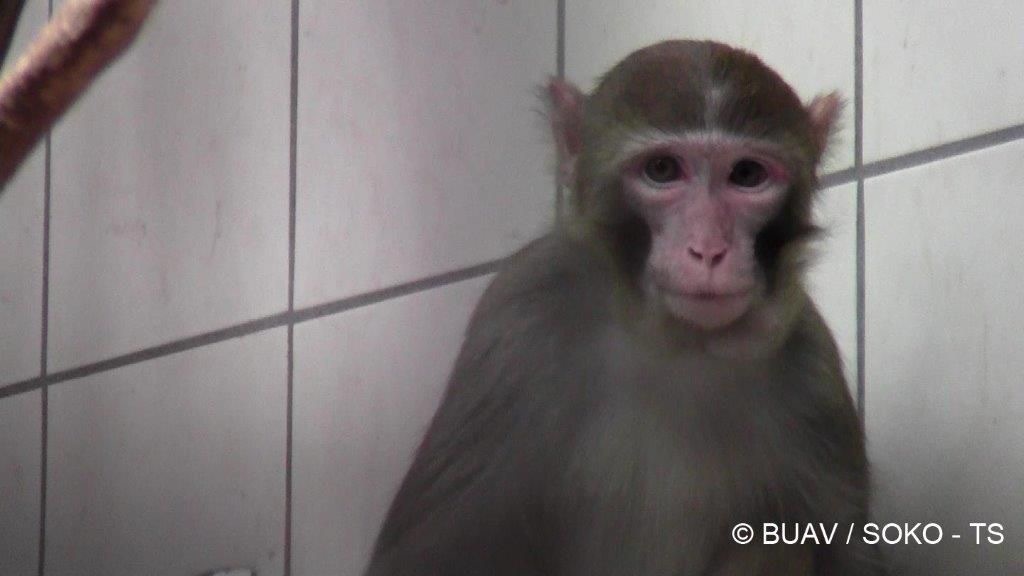

One Voice demands to know where are the monkeys of the Max Planck Institute
Along with other European animal advocates, One Voice wants to put an end to the ambiguity surrounding laboratory monkeys who survive the Max Planck Institute for Biological Cybernetics (IMP) in Tübingen (Germany).
This international mobilization follows a request for access rights in July 2017 by One Voice, Ärzte-gegen-Tierversuche eV (Germany) and Cruelty Free International (United Kingdom) to the authorities of the Länder of Baden -Wuerttemberg. Indeed, as part of this request, only one laboratory, that of the Catholic University of Louvain (Belgium), officially recognized that its Department of Neuroscience had
received five monkeys from the IMP. No other animal testing centre has agreed to make public the origins, current location and treatment of primates that they have received from the IMP.
In 2014, the IMP was at the centre of controversy, following the disclosure of poignant videos revealing the immense suffering of primates, forced to participate, sometimes for several years, in neuroscience research involving invasive surgery of the brain, severe water deprivation and various physical and psychological constraints (1). On these unsustainable images, eight monkeys from French farms had been identified. One is dead, but Leah, Hugo, Tom, Lisa, Max, Mila and Lucie can still be saved. One Voice has since been campaigning for their release and their safe placement in a sanctuary.
Following an international mobilization, in 2016, the IMP announced to stop their controversial experiments on primates. One Voice, Ärzte gegen-Tierversuche e.V. and Cruelty Free International, supported by Jane Goodall, had demanded that surviving monkeys be released into a sanctuary. No information on their future has, however, been made public. It is feared that the IMP has made the decision to send them to other laboratories in Europe for further experiments.
Muriel Arnal, President of One Voice, strongly urges: “It is unacceptable that the place of detention and the fate of these monkeys be kept a secret. IMP is a European laboratory, financed by public funds. While opinion in Germany and Europe has been stirred by the suffering endured by primates in this establishments, while the animal research industry claims to act with transparency, we believe that the public finally has the right to know what has happened to them.”
Lack of transparency and contested experiments
In addition to the ethical and moral issues raised by primate experimentation, the associations also challenge the scientific relevance to that of humans, such as neuroscience work because of the differences between our brain and that of monkeys.
Muriel Arnal recalls that: “A recent scientific study has found that the relevance of data collected by researchers using primate experiments in regards to humans has been overestimated (2). This study identifies several alternative methods adapted to neuroscience, more ethical and more useful for medical progress and directly applicable to humans. But they are neglected by researchers who still continue their experiments on primates, research which is rarely crucial towards a real medical breakthrough and in the mean time they continue to kill a large number of primates.”
NOTES:
1. Monkeys at the Max Planck Institute for Biological Cybernetics have been subjected to highly invasive surgery by implanting electrodes and / or recording devices into their brains, deprived of water to be able to constrain them, to make them obey. Physical coercion (use of neck collars and spikes) for the transfer from the cages and into a restraining device (“chair for primates”) which holds them by the neck and the body in an uncomfortable and abnormal position. Thirsty, thus reduced to immobility, the monkeys are exposed – up to 5 hours a day, five days a week – to screen images and different stimuli while the researchers record the data of their brain. The same monkeys, held for years, are again reused in this research.
2. Bailey J & Taylor K. (2016). Nonhuman primates in neuroscience research: the facts going against its scientific necessity. ATLA 44, 43-69)